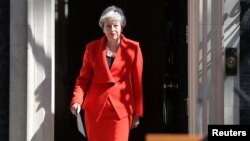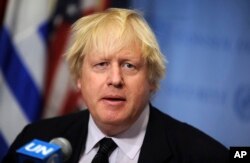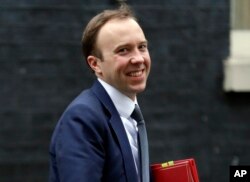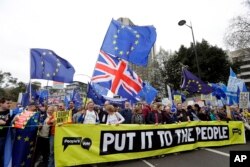The resignation announcement Friday by the country’s Conservative prime minister Theresa May has increased the likelihood of Britain having to hold a general election this year, say analysts and lawmakers.
That would add even more uncertainty to the country’s chaotic departure from the European Union.
Within hours of May’s tearful announcement, moderate Conservative lawmakers who want Britain to remain either in the European Union or closely tied to it, warned they might have no choice but to withhold support for her successor, if it turns out to be Boris Johnson, the former foreign secretary and political maverick, who has the backing of many in the Brexit wing of the party.
Theresa May’s successor — who will be chosen in a party vote by the end of July — will almost certainly face an immediate confidence motion in the House of Commons brought by the opposition parties.
Johnson, who’s considered the frontrunner in a leadership contest that could see as many as 16 contenders, staked out in a speech Friday a hardline Brexit position, saying at a conference in Switzerland that Britain should leave the EU on October 31, whether parliament finally approves May’s contentious exit deal with Brussels or not.
The next prime minister must “put Brexit to bed,” he said. Johnson’s main rivals, foreign secretary Jeremy Hunt, interior minister Sajid Javid and health minister Matt Hancock seem determined not to be outflanked by Johnson in the leadership race and have also issued hardline statements. “We need to deliver Brexit, and I will deliver Brexit, and we need to move this country forward, taking all the opportunities that Brexit brings,” Hancock said Saturday in announcing his candidacy.
May’s fate was sealed when the British House of Commons declined three times to approve her Brexit Withdrawal Agreement — a deal vehemently opposed by a third of her own parliamentary party on the grounds it would keep Britain subservient to EU regulations and rules and prevent it from negotiating trade deals bilaterally with non-EU countries.
Brussels has refused to reopen negotiations on the deal, which EU officials say is the best they can offer.
Some pro-EU Conservatives, who want a second Brexit referendum, signaled they might withhold backing for a Johnson government. “I will support any Conservative PM who is sober and responsible to recognize that we can only leave the EU with an agreement,” Guto Bebb, a Conservative lawmaker told The Times newspaper.
A long-odds contender to succeed Theresa May, Rory Stewart, the international development minister and a party centrist, said Saturday he wouldn't be prepared to serve in a cabinet led by Johnson. He told Sky News: “I sat down with Boris Johnson two weeks ago and he said to me he would not be pushing for a policy of ‘a no-deal’ Brexit. I left the room feeling that we had an understanding. I now understand, from what he said yesterday, he is going to try to crash us out of the European Union at the end of October... that is not being straight with people.”
Britain’s fractious Conservatives are ruling as a minority government, and they rely on the support of a Northern Irish party to give them a working majority of just five in the House of Commons. A handful of Conservative standouts could trigger a chain of events leading to an early election the Conservatives are unlikely to win.
On Sunday the results of a European parliamentary election Britons voted in on Thursday are likely to highlight the highly dangerous electoral landscape for the Conservatives. Pollsters predict Britain’s storied ruling party will record the worst ever electoral performance with the newly-formed hardline Brexit Party of Nigel Farage topping the poll followed by the pro-EU Liberal Democrats.
Britain’s main opposition Labour Party, which has also split over Brexit, is also likely to fare poorly, say pollsters.
Moderate Conservatives and Johnson’s longtime political rivals are scrambling to stop him succeeding Theresa May.
Aside from the Brexit issue, they say his chaotic private life and serial relationships as well as his political unpredictability and inconsistency are dangerous liabilities. They also doubt he has the work ethic needed by a prime minister. As mayor of London — he served two terms in the post — he handed off day-to-day management to a deputy and was faulted for casualness when it came to the drudgery of administration and oversight.
EU diplomats are also concerned about Johnson’s unpredictability and habitual populist showmanship. “You never know what you are going to get with Johnson,” says an EU official. Another accused Johnson of basic political dishonesty, pointing to his repeated claims during the 2016 Brexit referendum campaign that Britain could easily pull off a favorable trade deal with Brussels after leaving the EU.
Notoriously Johnson announced during the campaign: “My policy on cake is pro having it and pro eating it.” Johnson is seen by some as being as divisive as Brexit itself.
But his supporters say Johnson, a favorite of party activists, has the star quality the party needs to win elections and curb the populist threat from Nigel Farage, an adept political campaigner.
They also claim he has the political creativity to break the Brexit deadlock that has turned traditional British politics upside down and might even have the ability to persuade hardline Brexiters to accept a compromise and something short of their objective to break completely with the EU.
But Brussels is already warning that it won't tolerate a bid by May’s successor, whoever it is, to seek any changes or serious tweaks to the Brexit Withdrawal Agreement concluded with May after two years of haggling.
Analysts say May was handed a thankless and near impossible Brexit task, although some blame her for missteps that added to the disarray, and that whoever succeeds her will also struggle to unite the Conservatives and persuade Brussels to start afresh to craft a new deal able to secure British parliamentary approval. May was broken by Brexit, serving one of the shortest terms of any recent British prime minister.
Commentator Daniel Finkelstein argues that May’s successor will have to explore alternatives to May’s approach and will have no option because of the parliamentary arithmetic to “seek a new deal from the EU and use a genuine determination to leave without a deal as a way of wringing concessions” from Brussels.
If that fails the new leader will have to dare the House of Commons to accept a no-deal exit and trigger an election, if it fails to endorse a sharp break from the EU. But an election would be a high risk endeavor for the Conservatives given the Brexit schism in the party and most pollsters say the result would be another hung parliament and most likely a Labour-led coalition government.
The unfolding high-stakes political drama in London is alarming Brussels and the national leaders of EU member states. They fear May’s departure will increase the risks of Britain messily crashing out of the bloc.
“What can someone else do that she did not do?” asked Jean-Claude Juncker, the president of the European Commission, during an interview with a German broadcaster. “My working hypothesis is that the British will quit on October 31,” he added.
EU officials have joined a chorus of warnings coming from the Continent urging Conservative hopefuls not to seek half-membership in the bloc and expect any changes to the deal they agreed with May last November. They say the problem wasn't Theresa May and that with her departure the fundamental difficulties remain — a deadlocked British parliament, a split down the middle among British voters over Brexit and the need for Brussels to ensure the integrity of the EU and not to compromise the basic foundations of the bloc.
“A hard Brexit appears to be a reality that is near impossible to stop,” a Spanish government spokeswoman said Friday.
“On the European side there is absolutely no intention to reopen the withdrawal agreement,” said Guy Verhofstadt, the European parliament’s lead negotiator in Brexit talks.












